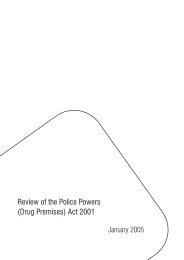Crimes (Forensic Procedures) Act 2000 - NSW Ombudsman - NSW ...
Crimes (Forensic Procedures) Act 2000 - NSW Ombudsman - NSW ...
Crimes (Forensic Procedures) Act 2000 - NSW Ombudsman - NSW ...
You also want an ePaper? Increase the reach of your titles
YUMPU automatically turns print PDFs into web optimized ePapers that Google loves.
Case Study 15<br />
An elderly woman was holding her purse while waiting for the bus. A young man asked her for money and<br />
when she declined, grabbed her purse. A struggle ensured, during which the man indicated a number of burns<br />
on his arm, which he said he had done himself, and threatened to do the same to the woman if she did not let<br />
go of her purse. She eventually let go, and the man ran off. Several bystanders chased the man and held him<br />
on the ground until police arrived. Police arrested the man and recorded that while in custody, he continually<br />
cried, punched himself in the head, and at times became aggressive. Police decided not to interview the man<br />
on account of “his rather odd behaviour.” However, they did ask him to consent to a forensic procedure, which<br />
he did. Police then took a number of photographs of the man. 491<br />
We note with concern that in these instances police conducted forensic procedures by consent, when it appears from<br />
the circumstances described that it may have been necessary to seek a court order before proceeding.<br />
The legislation and policies referred to above should assist officers in identifying and dealing with incapable people.<br />
However, neither the <strong>Act</strong> nor the <strong>NSW</strong> Police SOPs for forensic procedures provide any information to assist officers in<br />
determining whether a person is incapable for the purposes of the <strong>Act</strong>. The <strong>Act</strong> sets out a test, but not a procedure for<br />
identifying whether a person is capable of giving informed consent.<br />
Recommendation 17<br />
The forensic procedure SOPs include guidelines on identifying and communicating with incapable people.<br />
These guidelines should be established in consultation with the Guardianship Tribunal and disability advocates<br />
and should cover the information and factors to be considered in assessing a suspect or volunteer’s capacity.<br />
Recommendation 18<br />
<strong>NSW</strong> Police provide further training and guidance to police officers on the practical and legal considerations in<br />
dealing with ‘incapable persons’ under the <strong>Crimes</strong> (<strong>Forensic</strong> <strong>Procedures</strong>) <strong>Act</strong> <strong>2000</strong>.<br />
<strong>NSW</strong> Police does not support recommendation 17 on the basis that “any such progression should be considered in a<br />
general nature from an organisational viewpoint.” 492 However, it supports recommendation 18, and has advised it will<br />
“examine current training material with a view to improving aspects relating to incapable persons”. 493<br />
7.2.3.4. That the forensic procedure might produce evidence confirming or disproving the suspect<br />
committed an offence<br />
Before asking a suspect to consent to a forensic procedure, police must be satisfied that there are reasonable<br />
grounds to believe that the forensic procedure might produce evidence tending to confirm or disprove that the<br />
suspect committed an offence, another offence arising out of the same circumstances, or another offence in respect<br />
of which evidence likely to be obtained as a result of carrying out the procedure on the suspect is likely to have<br />
probative value. 494<br />
If the relevant offence is an indictable offence, police may request consent to any type of forensic procedure. If the<br />
relevant offence is a summary offence, for example offensive conduct or language, possession of a knife in a public<br />
place or defacing walls with graffiti, 495 police may only request consent to a non-intimate forensic procedure. 496 This<br />
means that police can only request a DNA sample if there are reasonable grounds to believe that it might produce<br />
evidence tending to confirm or disprove that the suspect committed an indictable offence. An indictable offence can<br />
include property, drug, personal violence, fraud and arson offences, 497 and can be dealt with by the District Court<br />
before a judge and jury. Some indictable offences can be dealt with in the Local Court by a magistrate unless either<br />
the accused person or prosecuting authority elects to have the matter heard in the District Court.<br />
92<br />
<strong>NSW</strong> <strong>Ombudsman</strong><br />
DNA sampling and other forensic procedures conducted on suspects and volunteers under the <strong>Crimes</strong> (<strong>Forensic</strong> <strong>Procedures</strong>) <strong>Act</strong> <strong>2000</strong>

















